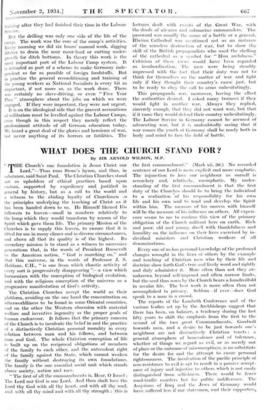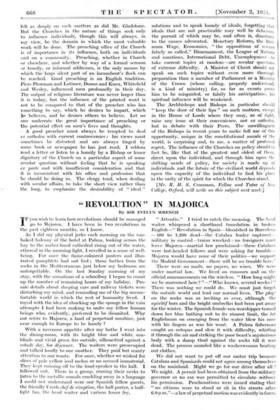WHAT DOES THE CHURCH STAND FOR ?
By SIR ARNOLD WILSON, M.P.
"THE Church's one foundation is Jesus Christ our Lord."—Thus runs Stone's hymn, and thus, in substance, said Saint Paul. The Christian Churches stand not as upholders of ethical practices based upon custom, supported by expediency and justified in general. by. history, but as a call to the world and a witness to the abiding loyalty of Churchmen .o the principles underlying the teaching of Christ as it has been handed down to us. He Himself likened His followers to leaven—small in numbers relatively to the lump which they would transform by reason of the Spirit which gave them life. The primary Mission of the Churches is to supply this leaven, to ensure that it is fitted for use in many climes and in diverse circumstances, and above all that its quality is of the highest. Its secondary mission is to stand as a witness to successive generations that, in the words of President Roosevelt to the American nation, " God is marching on," and that this universe, in the words of Professor J. S. Haldane, C.H., " is one from which chaotic activity of every sort is progressively disappearing "—a view which harmonizes with the conception of biological evolution, and with the religious conception of the universe as a progressive manifestation of God's activity.
The Christian Churches accept the world as their platform, avoiding on the one hand the concentration on otherworldliness to be found in some Oriental countries, and on the other the Western obsession with material welfare and inventive ingenuity as the proper goals of human endeavour. It follows that the primary concern of the Church is to inculcate the belief in and the practice of a .distinctively Christian personal morality in every relation between man and his fellows, and between man and God. The whole Christian conception of life is built up on the reciprocal obligations of members of the family to each other, and the antecedent right of the family against the State, which cannot weaken the family without destroying its own foundations. The family is the one essential social unit which stands above society, nation and race.
" The first of all Iliccommandinents is, Hear, 0 Israel ; The Lord our God is one Lord. And thou shalt love the Lord thy God with all thy heart, and, with all thy soul, and with all thy mind and with all thy strength this is the first commandment." (Mark xii, SO.) No recorded sentence of our Lord is more explicit and more emphatic. The injunction to love our neighbour as ourself is secondary and, relatively, unemphatic. My under- standing of the first commandment is that the first duty of the Churches should be to bring the individual to a realization of his responsibility for his own life and his own soul to tend and develop the Spirit within him. The measure of his success with himself will be the measure of his influence on others. All experi- ence seems to me to confirm this view of the primary obligation of the Church militant here on earth. Rich and poor, old and young, dwell with thankfulness and humility on the influence on their lives exercised by in- dividual ministers and Christian workers of all denominations.
Every one of us has personal knowledge of the profound changes wrought in the lives of others by the example and teaching of Christian men who by their life and doctrine show forth God's true and lively word and rightly and duly administer it. More often than not they are unknown beyond self-imposed and often narrow limits, but the seed thus sown by the Church bears a hundredfold in secular life. The best work is more often than not accomplished in privacy. Seldom—if ever—does God speak to a man in a crowd.
The reports of the Lambeth Conference and of the various bodies set up by the Archbishops suggest that there has been, on balance, a tendency during the last fifty years to shift the emphasis from the first to the second of the two great Commandments. Goodwill towards men, and a desire to be just towards one's neighbour arc not distinctively Christian tenets : general atmosphere of benevolence and of tolerance, whether of things we regard as evil, or as merely out of place or the outcome of misconceptions, is no substitute for the desire for and the attempt to ensue personal righteousness. The inculcation of the pacific principle of non-resistance to evil is apt to result in a passive accept- ance- of injury and injustice to others which is not easily distinguished from selfishness. There would be fewer road-traffic murders but for public indifference. The Assyrians of Iraq and the Jews of Germany would have suffered less if our statesmen, and their supporters, felt as deeply on such matters as did Mr. Gladstone. But the Churches in the nature of things seek only to influence individuals, though this will always, in tny view, be the domain in which the most valuable work will be done. The preaching office of the Church is of importance in its influence, both on individuals and on a community. Preaching, whether in Church or elsewhere, and whether by way of a formal sermon or homily, or informal addresses, is the only means by which the large silent part of an incumbent's flock can be reached. Good preaching is an English tradition. Piers Plowman and Latimer, Donne and Knox, Urhitefield and Wesley, influenced men profoundly in their day: The output of religious literature was never larger than it is today, but the influence of the printed word is not to -be compared to that of the preacher who has something to say, which he desires to impart, which he believes, and he desires others to believe. Let no one underrate the great importance of preaching or the potential effect on men's lives and -thoughts.
A good preacher must always be tempted to deal ex cathedra with current controversies-: his views must sometimes be distorted and are always tinged by some book or newspaper he has just .read. I seldom read a letter or listen to a homily by a Bishop or lesser dignitary of the Church on a particular aspect of some secular question without feeling that he is speaking ex parte and with insufficient consideration and that it is inconsistent with his office and profession that he should be doing so. The clergy tend, when dealing with secular affairs, to take the short view rather than the long, to emphasize the desirability of " ideal " solutions and to speak loosely of ideals, forgetting that ideals that are not practicable may well be delusions, the pursuit of which may be, and often is, disastrous to the causes advocated. Monetary Reform,. the Mini- mum Wage, Economics, " the oppositions of science falsely so called;" Disarmament, the League of Nations and sanctions, International Debt, Unemployment—to take current- topics at random—are secular questions of extreme difficulty. A Minister of Christ should not speak on such topics without even more thorough preparation than a member of _Parliament or a Minister of the Crown (whose calling, properly understood, is a kind of ministry) for, so far as. events prove him. to be Misguided, or falsify his anticipations, his spiritual influence will be weakened. • . The Archbishops and Bishops in particular. should " keep the door of their lips " on such matters, except in the House of Lords where they may, as of right,. raise any issue at their convenience, not ex cathedra, but in debate with their Peers. The unwillingness of the Bishops in recent years to make full use of this opportunity, unique in the constitutional annals of the world, is surprising and, to me, a matter .of profound regret. The-influence of the .Churches on policy should in fact .be, like that of the greatest and oldest of them, direct upon the individual, and through him upon the shifting sands of policy, for society is made up of individuals and the future of the civilized world depends upon the capacity of the individual to find his place in the unity of the spirit for which the Churches stand.
[Mr. R. H. S. Crossman, Fellow and Tutor of New College, Oxford, will write on this subject next week.]















































 Previous page
Previous page